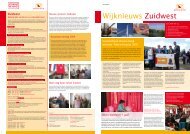freakonomics
freakonomics
freakonomics
You also want an ePaper? Increase the reach of your titles
YUMPU automatically turns print PDFs into web optimized ePapers that Google loves.
Has there ever been another art so devoutly converted into a science as the art of<br />
parenting?<br />
Over the recent decades, a vast and diverse flock of parenting experts has arisen. Anyone<br />
who tries even casually to follow their advice may be stymied, for the conventional<br />
wisdom on parenting seems to shift by the hour. Sometimes it is a case of one expert<br />
differing from another. At other times the most vocal experts suddenly agree en masse<br />
that the old wisdom was wrong and that the new wisdom is, for a little while at least,<br />
irrefutably right. Breast feeding, for example, is the only way to guarantee a healthy and<br />
intellectually advanced child—unless bottle feeding is the answer. A baby should always<br />
be put to sleep on her back—until it is decreed that she should only be put to sleep on her<br />
stomach. Eating liver is either a) toxic or b) imperative for brain development. Spare the<br />
rod and spoil the child; spank the child and go to jail.<br />
In her book Raising America: Experts, Parents, and a Century of Advice About Children,<br />
Ann Hulbert documented how parenting experts contradict one another and even<br />
themselves. Their banter might be hilarious were it not so confounding and, often, scary.<br />
Gary Ezzo, who in the Babywise book series endorses an “infant-management strategy”<br />
for moms and dads trying to “achieve excellence in parenting,” stresses how important it<br />
is to train a baby, early on, to sleep alone through the night. Otherwise, Ezzo warns, sleep<br />
deprivation might “negatively impact an infant’s developing central nervous system” and<br />
lead to learning disabilities. Advocates of “co-sleeping,” meanwhile, warn that sleeping<br />
alone is harmful to a baby’s psyche and that he should be brought into the “family bed.”<br />
What about stimulation? In 1983 T. Berry Brazelton wrote that a baby arrives in the<br />
world “beautifully prepared for the role of learning about him-or herself and the world all<br />
around.” Brazelton favored early, ardent stimulation—an “interactive” child. One<br />
hundred years earlier, however, L. Emmett Holt cautioned that a baby is not a<br />
“plaything.” There should be “no forcing, no pressure, no undue stimulation” during the<br />
first two years of a child’s life, Holt believed; the brain is growing so much during that<br />
time that overstimulation might cause “a great deal of harm.” He also believed that a<br />
crying baby should never be picked up unless it is in pain. As Holt explained, a baby<br />
should be left to cry for fifteen to thirty minutes a day: “It is the baby’s exercise.”<br />
The typical parenting expert, like experts in other fields, is prone to sound exceedingly<br />
sure of himself. An expert doesn’t so much argue the various sides of an issue as plant his<br />
flag firmly on one side. That’s because an expert whose argument reeks of restraint or<br />
nuance often doesn’t get much attention. An expert must be bold if he hopes to alchemize<br />
his homespun theory into conventional wisdom. His best chance of doing so is to engage<br />
the public’s emotions, for emotion is the enemy of rational argument. And as emotions<br />
go, one of them—fear—is more potent than the rest. The superpredator, Iraqi weapons of<br />
mass destruction, mad-cow disease, crib death: how can we fail to heed the expert’s<br />
advice on these horrors when, like that mean uncle telling too-scary stories to too-young<br />
children, he has reduced us to quivers?<br />
No one is more susceptible to an expert’s fearmongering than a parent. Fear is in fact a<br />
major component of the act of parenting. A parent, after all, is the steward of another









